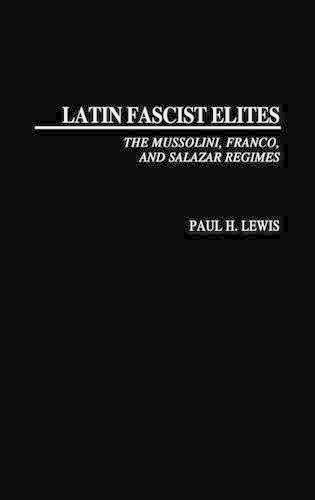
Latin Fascist Elites: The Mussolini, Franco, and Salazar Regimes
(Hardback)
Publishing Details
Latin Fascist Elites: The Mussolini, Franco, and Salazar Regimes
By (Author) Paul H. Lewis
Bloomsbury Publishing PLC
Praeger Publishers Inc
30th December 2002
United States
Classifications
General
Non Fiction
320.533094
Physical Properties
Hardback
256
Width 156mm, Height 235mm
482g
Description
Many dictatorships are short-lived, but a few manage to stay in power for decades. Lewis takes three Latin fascist tyrantsMussolini, Franco, and Salazarand shows how they perpetuated their rule through the careful recruitment and circulation of top-echelon subordinates to carry out their orders. Long-established dictatorships have to respond to political and social pressures surrounding them, just as democracies do, but it is harder to study them because they are closed systems. One possible way of viewing their internal processes is by observing who they recruit into top leadership positions. Every dictator, however powerful, must delegate some authortiy to an elite stratum just below him. By watching which kinds of men are recruited, how long they are kept in power, and whether different skills are sought at different times, it may be possible to chart the evolution of a 20- or 30-year regime. The Mussolini, Franco, and Salazar regimes all fit the criteria of being long-established. Mussolini ruled for almost 21 years, Franco for over 37, and Salazar for 36. Moreover, all three shared a family resemblance as being fascist. Comparing them affords the additional advantage of adding to our understanding of the Latin variant of fascism, as contrasted to the Central and Eastern European. A provocative work for scholars, students, and other researchers involved with European Politics, Modern European History, and fascist regimes.
Reviews
Aiming to explore and analyze the varieties of elites, the circumstances of their service, and their techniques of power, this study offers very useful statistical information about length of ministerial service, frequency of changes of ministers, their educational and regional backgrounds, and ways in which they were employed by their respective dictators....Recommended. Useful for specialists.-Choice
"Aiming to explore and analyze the varieties of elites, the circumstances of their service, and their techniques of power, this study offers very useful statistical information about length of ministerial service, frequency of changes of ministers, their educational and regional backgrounds, and ways in which they were employed by their respective dictators....Recommended. Useful for specialists."-Choice
Author Bio
PAUL H. LEWIS is Professor of Political Science at Tulane University. Among his earlier publications is Guerrillas and Generals: The Dirty War in Argentina (2001).
